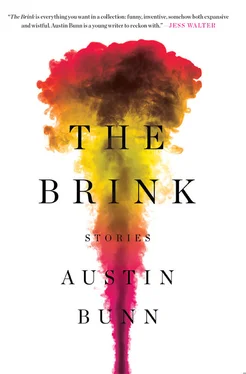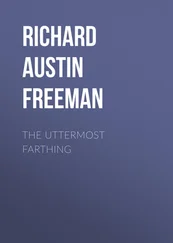She nods. “Oh that’s a hard one, that one takes time,” she says. The fingers have been snipped off her gloves, and with bluing fingers, she accordions the pleats in her skirt. Her knees are right there, offered through the rips in her leggings. The itch says, Start there .
She holds out her hand. “You want this?” she says. A mint-colored pill rests in her palm, a fish-tank pebble. “Eddie gave it to me and told me it was aspirin.”
I have competition. I sit next to her on the edge. “That’s not aspirin.”
“It figures,” she says. “He’s a creepster.”
“Have you seen his movies?”
“I watched like ten minutes of the one about the imp and the spell and the whatever.”
“So why’d you sign up to join the vampire squad?”
“He said I could die in his next one,” she says. “Gotta start somewhere.”
“Maybe one day you’ll get to be the final girl,” I say.
Jess squeezes up her face. “She’s the one who never has sex, right? Because when you have sex in those movies you die.”
“The final girl is the last one alive, that’s all that matters,” I say. “The beautiful one nobody notices, except we do, the audience. She’s the one with the inner resources and the keys and the journey and the one weird implement that brings death. Chopsticks. Or the poker. Or hair spray on fire. And then at the end, when she looks over the railing, or into the pit, that’s the abyss looking into her. And she’s alive. And her being alive means we’re alive.”
You don’t need to be all that smart. You just have to make the girl feel like she gives off light.
“You watch a lot of movies, Randy,” she says, and it’s so much specialness that it distracts me from asking how she knows my name.
I’d just ruined the Bronco twins. Two cowlicky bullies from East Rutland whose princely poses I saw and went, Here are two people who deserve some damage. All it took was a little more cherry and less nude in the paintbrush. When I was done, Kenny Bronco looked like a flaming leper.
So I didn’t notice her at first. I almost passed her prints straight into the shipment. Almost. But then I took her in: the blue sweater, the brown hair, that crucifix nestled at the base of her neck. Her skin was trophy golden. She seemed familiar, like a sequel.
And then it wasn’t her face I was seeing, but a face I’ve seen so many times in my head that he’s my Forest Glade. Her brother’s face, in the obituaries. My mother had kept the page for me until after I was out of the hospital and could focus. Eric Denning, seventeen. He’d started his own lawn-mowing company and was planning, like half of everybody, on getting the hell out of Rutland. I was too, before I became a monster.
I went to Kramer’s catalog to confirm what I already knew: the photo in my hand was Jessica Denning. I never knew your brother, Jessica. But five years ago, drunk and bored, he bent time around me. He crossed the yellow line and splintered my life in two.
I took the digital files and dragged them into the trash. My pulse jumped when Kramer came into the room. He dove into the office fridge.
“Hey, boss, we’re missing this one girl’s prints,” I said. “Can’t find her in the bin. Some kind of error in the camera?”
Kramer popped open his soda. “Just schedule her for next week, then,” he said. “She’s all yours.”
Suddenly, sirens. Down below, in the firehouse parking lot, two police cars pull up. The blue and right lights make everybody on the roof wave the air to waft away the dope smell which, for about five seconds, seems like an idea. Then everybody runs. Eddie hitches his pants, heads to the stairs. “Remember the legend of Edward Cosimano!” he shouts.
“Cops are here,” I tell her.
“Are you serious?” she says. She tugs her cape in close. “I can’t see.”
Solvang crashes into us, throwing one arm around me. “Hey, you — you should love this guy,” he says to her. “Randy is ready for love.” I’d like to kill him right now. I see Solvang dead on a punji stick, like one of his cards.
Callie comes and catches him. He got in a drinking contest with one of the zombies, she says. Jess snaps off her fangs and says, “Let’s go.”
Sometimes you walk up to a wall and you walk through.
I lope with Solvang’s arm around my shoulder, and we work our way down the stairs until we’re ground level. Out front, I can hear Eddie arguing with the cops. Cars tear out of the lot, nipping past us. I dump Solvang in the backseat of my car. When I turn around, Callie is wiping her mouth with a bit of her gown. There’s a grim puddle at her feet.
“I think I just vomited,” Callie says, without surprise.
Jess steps around. “Shotgun.”
We drive in quiet. As we pull into Callie and Solvang’s driveway, their babysitter fumes on the wooden stairs. “I have been waiting for hours,” she goes. “I was supposed to be at a rave at ten.”
Solvang twists out the door and just spills. The babysitter, disgusted, hops on her ten-speed. “The kid’s asleep — if you care,” she says, and goes.
For a moment, we just sit there. “I’m pregnant,” Callie goes, into her hands. “I know nobody cares. I just thought somebody should know.”
Nobody says a word. I walk Solvang back to the house with Callie trailing behind in the silence she made. Their place is a mess, like the baby is doing the arranging. Life-size cutouts of WWF wrestling guys — Solvang is a fan — circle their living room, peopling it with goons. I roll Solvang off onto the bed in the master bedroom. It’s a waterbed, and the wave action sounds like a stomach digesting.
Solvang is a little gray in the lips. He wakes up some and pulls my head toward his, mumbling. Somebody gave him a pill on the roof, he says. One of Eddie’s aspirins. Then he takes my hand and rests it on his hard-on. He’s proud, like it’s a science project that managed to work after all.
“That’s the proof,” he says, bleary.
“Proof of what?”
“Proof I’m not dead.”
In the kitchen, Callie sits at their tiny table, a young crone. She plays with her wand, remolds the star points that have blunted.
“Callie, I’m sorry, but I’ve got to go,” I say.
She taps her wand once against her belly. “Bing,” she says. “All gone.” Back at the car, Jess’s working on her eyes, trying to fish out the contacts. The rip at her knee, I swear, is bigger.
“I can’t get these things out,” she says. “And now it’s kind of scaring me.”
“Where am I taking you?” I ask.
She stops for a minute. “Not home,” she says. “Not yet.”
Just three folding chairs in twenty feet square. I was four months into my treatment, pacing the clinic courtyard. The walls of the courtyard were glass and with noonday sun, we got our reflections back. The heat made the itch so I couldn’t stay in the sun for long. I pressed my fingers on the left side of my face to feel out the tender parts. My face looked like somebody fried an egg there and forgot about it. I looked like something you’d never want to look at.
“So what happened to the other guy?” I heard behind me.
He was in jeans and sunglasses, sitting in one of the folding chairs kicked back on its rear two legs. He was a tree cowboy, one of the loggers from upstate, compact and hardy. But from the collar of his shirt rose a bright red welt, up his neck, onto his jaw.
“Sorry?” I said.
“The other guy,” the cowboy asked. “The guy that hit you in his car. The nurses talk.”
“He died,” I said.
The man nodded. “My ex-wife set my house on fire,” he said. “Since then, I’ve been coming back here. They take pieces of me and move them around so I can look like everybody else.”
Читать дальше











